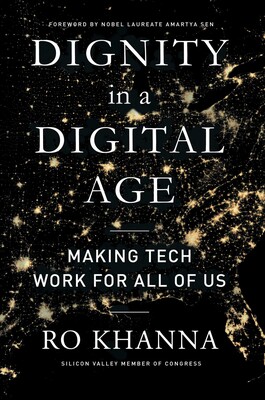When Gavin Newsom published “Citizenville” in 2014, it solidified him as a politician legitimately in touch with digital democracy. This, at a time when not many politicians or political leaders were knowledgeable and well-versed on the powerful combination of civics and technology.
Wiith “Dignity in a Digital Age: Making Tech Work for All of Us,” Congressman Ro Khanna has grabbed the digital baton and is running with it. Khanna gets not only how government can effectively leverage technology to build a more healthy democracy, but also civil society as a whole.
Khanna, the “Silicon Valley member of Congress,” represents a district that includes and is situated at the epicenter of technology – including the headquarters of Google, Apple and Facebook, to name just a few – so it’s understandable that he has more depth than most when it comes to all things digital. While we’ve come to expect politicians to have a surface level awareness of the issues of our times – especially technology – Khanna gets the one that is now deeply embedded into every facet of our lives.
“Silicon Valley is where I developed a true appreciation for entrepreneurs,” he writes. “There are three attributes that make it a magical place for start-ups and founders – which incidentally are in direct contrast to how Washington, D.C., works. First, people are willing to take risks and are not penalized for failure … Second, people think big … Finally, those who are unconventional are not shunned.”
While Khanna’s district and interests are rooted in Silicon Valley, he doesn’t let tech companies off easy, insisting they must play a more active role, especially when it comes to privacy, personal data and online civility and taking responsibility for their negative impact on our increasingly digital society.
This is emphasized by his proposed “internet bill of rights,” which – it’s important to list these verbatim – includes opt-in consent; knowledge of data use; deleting personal data and abusive content; security and notification; portability and interoperability; net neutrality; data minimization for internet access; multiple providers and platforms; prevent unfair data discrimination; and fiduciary duty.
Unabashedly left-of-center politically, Khanna doesn’t refrain from showing his support and policy ideas for how America can better address issues related to basic human rights, particularly education, a distributed workforce, diversity and equality and income disparity.
“To create a full vision of progressive capitalism – where everyone has real freedom to develop their goals and excel – we will need to create an ecosystem that ensures health care, education, and a basic support system for all,” writes Khanna.
“Dignity in a Digital Age” is thorough and substantive on policy ideas. Undoubtedly, many of these will take a healthy dose of political wrangling to be funded and implemented, however, just as Silicon Valley does, Khanna is “thinking different” and bigger. He cites working examples throughout of how businesses, universities and communities are already implementing these ideas. While some of these may fail long-term, his ambition for experimentation is reflective of his constituency, but also the urgent sense of our times.
At a time when civil society is becoming more dependent on technology – from products to policies – we need political leadership that intricately understands the role it plays in our lives. Very few politicians appreciate and fully grok how the two sync.
“The grand promise of the digital age is the possibility of aligning the aims of political justice with economic growth,” writes Khanna.
We officially have a politician that truly gets “twenty-first century citizenship” – as he calls it – and the role technology plays in the future of civil society.
Where he runs next with that baton is anyone’s guess, but we can only hope he’s thinking big.
